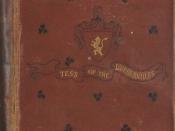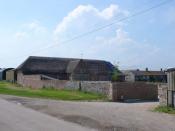A Tragic Life
Tragedy in our lives is caused not only by our direct and indirect relationships to people and events, but also by our feelings of disgust, longing, and depression over a long period of time, "Tragedy may also be created by an opposing environment either of things inherent in the universe, or of human institutions" (1895 Thomas Hardy). Whether the people or events consist of only small annoyances, they can escalate into large problems that can create, not only depression but death in one's life. Throughout both Thomas Hardy's Tess of the d'Urbervilles, and Margaret Laurence's The Stone Angel, comparisons are made between the varied incidents that send both Tess and Hagar's life into isolation and the similar causes for both of the women's tragic life.
The fist incident that is introduced is how both Tess's and Hagar's deaths are similarly caused by the deceitfulness of their loved one's, who consequently ruin their lives and isolate them from society.
The earliest tragic effect Alec has on Tess is his overpowering need for ruining her. Alec openly admits to helping Tess and her family by stating that, "Tess, your father has a new cob today...and the children have some toys" (63), but at the same time he tries to ruin her. He cannot help taking advantage of Tess and he destroys any affection she might have for him. This unfortunate flaw finally ruins her and casts her out of the social order.
Alec also tragedies Tess's life by his constant pursuit of her for a conquest. A previous conquest to Alec, openly admits that, " Ah, th'st think the' beest everybody, because the' beest first favorite with He [Alec] just now!" (58) This shows that Tess is just one of Alec's many successes and that he has no...


